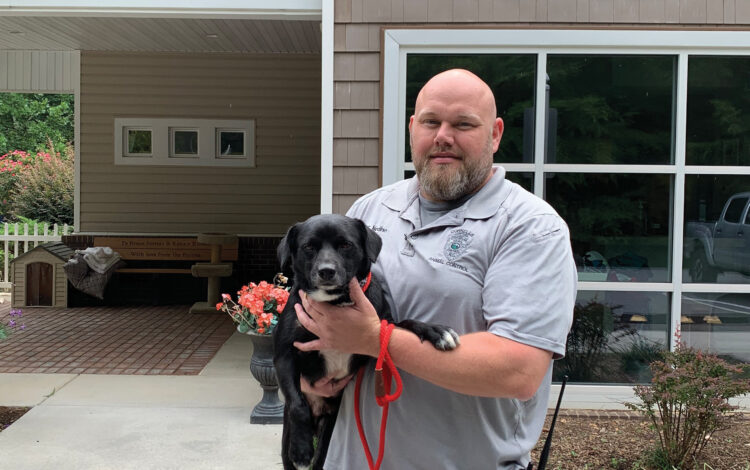
Trey Nodine and Stanley
Sept. 19. By TL Bernthal. Residents are showing the Cornelius Animal Shelter a lot of love again since the end of COVID-19 restrictions.
“We’re back to what we were, busy all the time,” says animal control officer Trey Nodine.
“There’s been a big influx of interest since COVID.”
The animal shelter is open again on a regular schedule and volunteers are in place.
Volunteer activities were suspended during the pandemic, but now volunteers are “back in full swing,” he says. There are 15 volunteer applications pending.
Not just dogs
In mid-August, the shelter had seven dogs available for adoption and 19 cats.
“We’ve been busy with cats coming in,” including surrenders of two older Siamese cats the owner didn’t make arrangements for before passing. Family members having no plan for pets when the owner dies accounts for many surrenders, Nodine says.
And spring into summer brings lots of kitten litters.
“People say they feed the neighborhood cat but don’t ‘own’ it, then they don’t know what to do when the cat has a litter,” Nodine says.
“That’s how we get a lot of kittens,” he says.
The shelter sometimes reaches its capacity of 36 cats, but usually not with dogs, Nodine says. Fewer dogs than cats come to the shelter, and the limit for dogs is 19. There is some wiggle room on capacity if animals are young.
The average stay at the shelter in 2021 was 25 days for dogs and 83 days for cats. Last year, the average for cats was higher than usual because there were older cats that take longer to find homes, Nodine says.
Pandemic returns
For the first time, the town shelter is seeing a trend of surrenders from Cornelius residents of animals adopted during the pandemic from Charlotte Mecklenburg animal services, Nodine says.
Charlotte Mecklenburg will not take back animals they have adopted out, Nodine says, which he understands because of the volume of animals they serve.
Many shelters and rescues are overwhelmed by the number of pets adopted during the pandemic that are being returned because families can no longer care for them as inflation rises and worries about the economy persist.
The Cornelius Animal Shelter hasn’t had that issue, mostly because pet surrenders are taken only from town residents, a smaller pool of pet owners than what other shelters and rescues serve.
Plans to expand?
There are no official plans to expand the Cornelius facility, although Nodine says the need exists.
He is grateful the town approved a garage addition and small rooms for storage that recently have been completed.
The garage allows the animal control truck to pull in and unload an animal, which is a much safer process than taking the animals through the lobby, Nodine says.
Supply donations coming in again
This summer has seen the return of individuals and groups dropping off donations, so supplies of towels and food are at good levels.
“Of course, once I say that, something will happen and we’ll need more,” Nodine says and chuckles. “We go through a lot of towels and supplies.”
Nodine, who has been a town animal control officer for 12 years, is one of two full-time officers. Long-time officer Kenny Russell is the other. They are joined by a part-time officer for 18-20 hours a week.
The part-time position allows the shelter to be open to the public on a regular schedule as well as accommodate after-hour or weekend appointments to see adoptable dogs and cats.
“The more we can be available, the better chance there is to move an animal out to a home,” Nodine says.
Most dogs that come in are larger breeds, typically 50 lbs. and up, Nodine says.
“There’s plenty of pit and pit mixes, and Labs. Real Labs, not pit bulls some say are Labs,” Nodine says. “But really all kinds of breeds.”
Cats run the gamut from rag dolls, to Siamese to tabby and everything else, he says.
Animal control duties
The animal control officers are responsible for managing the Cornelius animal shelter and responding to all calls for service related to animals in the town limits.
The majority of calls to animal control are about dog and cat bites, Nodine says. Almost all are not serious, but ones where someone got nipped trying to trim a pet’s nails or during play.
Doctors who treat bites are required to report the incidents to the town and county.
Animals that have bitten someone must be quarantined either at animal control or in the home.
Animal shelter tasks
The animal shelter staff oversees volunteers, cleans kennels twice a day, feeds the animals, dispenses medicine, handles required paperwork and helps when potential adopters inquire about an animal.
Dogs are let out in outdoor runs, weather permitting, to go potty and play.
Most animals that come to the shelter are dogs and cats, although the shelter has taken in bunnies, birds, iguanas and a ball python.
The only animals the Cornelius Animal Shelter will take are owner-surrenders from town residents or strays found within town limits. The surrender fee is $40.
Taking care of our own
Charlotte Mecklenburg Animal Control provides service for the county, but Cornelius Animal Shelter tries to take care of its own so will keep animals until they are adopted. The county charges $40 for any animal the town takes to the county, and $400 for any single service it provides such as picking up a stray at night.
Those charges could add up quickly, Nodine says, which is why he is grateful that other Cornelius Police Department officers are good about bringing in strays when the shelter is closed and staff is off. Within the animal shelter building there is designated space for animal control. Animal control has its own kennels where a patrol officer can put a stray until the shelter staff arrive in the morning, Nodine says.
How to adopt
The first step is to fill out an application for a specific animal. Applications can be found on the town website or at the shelter.
Adoptions are never done on the same day, Nodine says.
Animals brought in are screened for temperament and receive veterinary services including shots, spay/neuter and micro-chipping before being available to leave with their forever family, Nodine says.
Adoption fees are $85 for a cat and $95 for a dog.
What’s next
A buddy-for-a-day program is being considered by town officials and Nodine hopes that is approved soon.
This would allow someone to take a dog out of the shelter for a day so the dog can experience a ride in a car, play in the park, get some one-on-one attention.
Less likely is a foster program. The animal shelter did that early on, before Nodine’s time there, but it didn’t work out because the fostered pets weren’t always available when potential adopters wanted to see them.
How to help
• Monetary donations can be made online or in person at the shelter. Donations go into a designated fund used for maintenance or unexpected needs.
• Donations of clean blankets, pee pads, sheets, towels, toys, cleaning supplies, and dog and cat food are welcome. Food for kittens is especially needed, Nodine says.
• If you’d like to volunteer, submit an application. Volunteers walk dogs, play with cats, do administrative tasks and help clean the shelter.
How it’s paid for
The FY23 budget for Animal Control is $248,692, according to Police Chief Kevin Black. The personnel costs for salary, over time, benefits that is budgeted for Animal Control staff in FY23 is $197,208, he said.
Additionally there are operating costs needed for care of the animals and operation of the unit. In FY23, the department has $51,484 budgeted for shelter operations, Black said.





